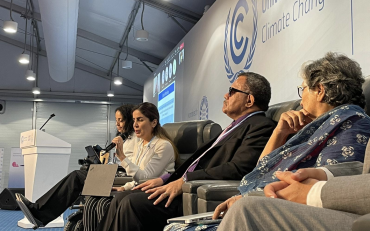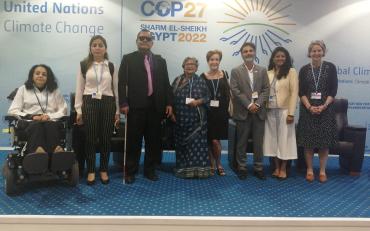People with Disabilities Develop an Agenda for Inclusive Climate Action – IDA and partners at an official side event at COP27
On November 10 in Sharm El-Sheik, the International Disability Alliance (IDA), the European Disability Forum, CBM UK, McGill University, Shanta Memorial Rehabilitation Centre (SMRC), Sustain Our Abilities and Human Rights Watch organized an official event on the side of COP27, with the appreciated co-sponsorship of the governments of Finland and Australia.
The event titled “From Exclusion to Leadership: People with Disabilities Develop an Agenda for Inclusive Climate Action” was the occasion to present the most recent evidence on the disproportionate impact of climate change on persons with disabilities, as well as to recommend measures to ensure persons with disabilities and their representative organizations are at the front of a rights-based and people-centered response to climate change.
The side event was moderated by Nadia Hadad, board member of the European Disability Forum (EDF), Asha Hans, from the Shanta Memorial Rehabilitation Centre, and by Marcalee Alexander, from Sustain Our Abilities.
The event saw the high-level participation of state representatives and UN independent experts. Opening remarks by Ian Fry, UN Special Rapporteur on Human Rights and Climate Change, focused on the need to open the climate change dialogue to allow persons with disabilities and OPDs a greater say in decision-making, particularly when it comes to loss and damage. In this regard, the Special Rapporteur stressed the importance of ensuring the reporting on fund distribution considers people with disabilities, including those that are displaced across international borders as a consequence of climate change.
Debbie Palmer, Energy, Climate and Environment Director of the UK Foreign Commonwealth and Development Office (FCDO), expressed FCDO’s commitment towards inclusive climate action, echoing the Special Rapporteur on the need to meaningfully involve OPDs and to encourage them to use their expertise as agents of change to support inclusive climate action. Ms Palmer stated FCDO’s willingness to work in partnership with key allies to accelerate global action including through key funds, such as the green climate fund. Highlighting the importance of strong political leadership, Ms Palmer announced that UK is joining a newly formed coalition of states working on disability inclusive climate action, initiated by the government of Finland.
Ms Kristen Tilley, Australian Ambassador for Climate Change, took the floor to express Australia’s commitment to ensure that climate change action is gender responsive and socially inclusive, and that respects, promotes, and fulfils the rights of persons with disabilities. Ms Tilley recalled Australia’s commitment at the global Disability Summit 2022 to develop a successful policy to underpin the rights and fundamental freedoms for all people with disabilities, including through the development cooperation.
In the second part of the side event, panelists presented some of the most recent research on the impact of climate change on persons with disabilities in the Pacific, Southeast Asia and Eastern Africa, as well as on the status of inclusion of climate policies, including the record of governments on inclusion of persons with disabilities in their climate policies and plans.
Setareki Macanawai, CEO of the Pacific Disability Forum (PDF) brought up evidence from the Pacific region, particularly Kiribati, Tuvalu and Solomon Islands. The research presented by Mr Macanawai focused on agriculture, fishing, and food security. In the three countries, as persons with disabilities are often unemployed and rely heavily on fishing and farming, they are highly affected in terms of access to food caused by land erosion, flooding and inundation of sea water. Shortages and lack of clean water particularly impact on women and girls with disabilities and their sexual and reproductive health.

As of next speaker, Tushar Wali, from CBM UK, presented the findings of a CBM Global research conducted in Madagascar and Bangladesh on the barriers to the engagement of persons with disabilities in climate action. Despite the willingness of persons with disabilities to engage in climate action, they often encounter barriers due to lack of funds, resources and the capacity to meaningfully engage. In particular, lack of recognition from governments and societies impedes effective inclusion in climate action. The adverse impact of climate change pushes people with disabilities and their families into further isolation and poverty.
Shanta Rau Barriga, presented a research conducted in Australia and Bangladesh by Human Rights Watch documenting experience of persons with disabilities and older persons in climate-related disasters. The research found that authorities failed to take effective steps to protect people with disabilities and older people from foreseeable harm from the extreme weather events, like floods. Local authorities did not provide warnings, adequate support, leaving older people and people with disabilities behind. An important, yet often overlooked issue raised by the research is the climate change impact on mental health. People who were older or with disabilities who did survive disasters shared their fear of being burdens to others. Finally, it was observed that experiences of poverty compounded the impacts of the floods on people with disabilities and older people.
Next on the panel was Elham Youssefian, International Disability Alliance, who presented a status report conducted in collaboration with McGill University on disability rights in climate change policies. It was found that only 37 State parties, which means 19 percent of countries who have ratified the Paris Agreement, has some reference to persons with disabilities in their National Determined Contributions (NDCs). Under Paris Agreement, all States parties are obliged to submit commitments known as NDCs on measures they will take to cut emissions and adapt to climate impacts. Only five parties mentioned persons with disabilities in mitigation plans. Fourteen mentioned persons with disabilities in adaptation and 19 mentioned both in mitigation and adaptation. Only 14 of them included concrete measures for disability inclusion. 17 of them recognize the participation of persons with disabilities and only in two of them, we have evidence of participation and involvement of persons with disabilities in the process.
When looking at climate national adaptation plans (NAPS), which are national plans to adapt with impacts of climate change, only 46 parties to the Paris Agreement (24 percent), have some reference to disability in their national adaptation plan. 15 of them have concrete measures again, two of them only reference the disability rights. Two of them recognize knowledge of persons with disabilities. 11 of them recognize participation, and only in one of them we have evidence of participation. However, most adaptation policies include very vague references to disability.
After presenting the evidence, the panelists provided their recommendations to different stakeholders. Keeping in mind that governments have a human rights obligation to address the impact of climate change,
- All stakeholders, including governments, UN bodies and civil society, need to ensure that people with disabilities and older people, specifically those with lived experience of extreme weather events, are included in all climate discussions.
- Emergency information, preparedness, and response programs must be inclusive of and accessible to everyone.
- Humanitarian actors shall ensure people with disabilities and older people have access to humanitarian support on an equal basis with others.
- Disaggregated data collection is required to capture the full scope of extreme weather events.
- All climate policies must be inclusive and accessible. To properly advance the human rights of persons with disabilities, these policies shall not be limited to transport, food security, but should also encompass energy and energy pricing, infrastructure, communication, economic wellbeing, employment and training, education, disaster preparedness, management and human rights action.
- Accessibility is a precondition for people with disabilities to engage meaningfully in the conversation, therefore sufficient budgetary means and reasonable accommodations are paramount
- More funds need to be allocated to build capacity of OPDs but also to push for joint collaboration with climate actors
The event was concluded by an intervention by Gerard Quinn, UN Special Rapporteur on the Rights of Persons with Disabilities, who recall that climate change has both a direct and indirect impact on key rights of persons with disabilities, including the right to life, the right to health, employment and livelihood, accessible evacuation, and indeed, accessible humanitarian intervention. So, there ought to be no longer a debate about the place of persons with disabilities in climate action but a more practical place about how we can move the dialogue forward. Climate action cannot be inclusive if persons with disabilities, who are the most affected, are not at the table. Nothing without us.
>> Watch the recording of the Side Event HERE.
Resources:
- Pacific Disability Forum, DISABILITY AND CLIMATE CHANGE IN THE PACIFIC Findings from Kiribati, Solomon Islands, and Tuvalu, August 2022. https://pacificdisability.org/wp-content/uploads/2022/08/PDF-Final-Report-on-Climate-Change-and-Persons-with-Disabilities.pdf
- CBM Global, Missing in Climate Action: Stories of persons with disabilities from the Global South, November 2022. https://cbm-global.org/wp-content/uploads/2022/11/Missing-in-Climate-Action-November-2022.pdf
- Human Rights Watch, LEAVE NO ONE BEHIND People with Disabilities and Older People in Climate-Related Disasters, November 2022. https://www.hrw.org/sites/default/files/media_2022/11/202211drd_global_LeaveNoOneBehind.pdf
- International Disability Alliance & McGill University, Status Report on Disability Rights in National Climate Policies, November 2022. https://www.internationaldisabilityalliance.org/sites/default/files/drcc_status_report_english_nov_2022_formatted.pdf

